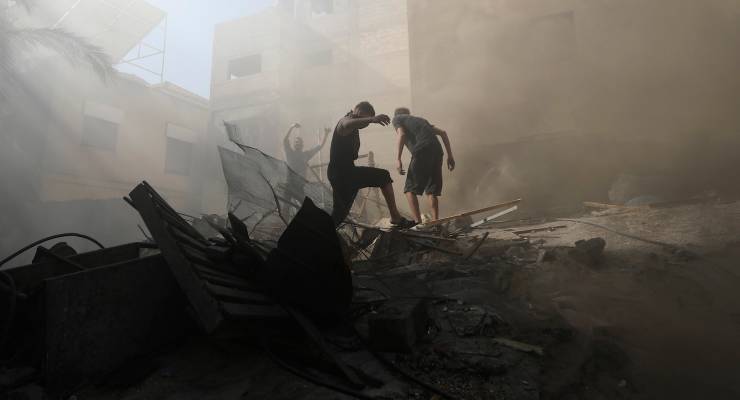
A week ago, my law firm tweeted a generic proposition, that “it is not OK to bomb a children’s hospital” as an experiment to see if there’s anything one can say in the context of Gaza that will be broadly accepted. It turns out there isn’t, but the responses got me thinking about the second casualty of war: the law.
We’ve moved a long way in a few weeks, from the claims that the “explosions” at various hospitals in the Gaza Strip were not from Israeli bombs but from misfired Hamas or Islamic Jihad rockets, to open acknowledgement that the Israel Defense Forces have indeed been firing on and around hospitals — but coupled with the assertion that they are entitled to do so.
There are two central themes to the defence of this action. One is the general proposition that war is hell; as one reply to our tweet put it, quoting American Civil War General William Sherman: “War is cruelty, and you cannot refine it.”
The same point was made at the weekend by UK Defence Secretary Grant Shapps, who noted that 35,000 civilians died when Britain firebombed Dresden in 1945, saying: “We’ve sort of forgotten, in war, very sadly, people lose their lives.”
The examples are illuminating, since there is ample legal basis for arguing that Sherman was a war criminal and Dresden a war crime. More importantly, both — by virtue of the appalling loss of human life they entailed — provided impetus for the development and refinement of a universal code for the “rules of war”. In theory, at least, we no longer consider their justifications adequate.
The second proposition is that the rules of war render Israel’s specific actions lawful anyway. We’ve been frequently referred to Articles 19 and 28 of the Geneva Convention, so let’s check that out.
There are four conventions, adopted in 1949 and supplemented by three protocols in 1977 and 2005. All countries (pretty much) have signed up to them. The relevant instrument is the “Geneva Convention relative to the Protection of Civilian Persons in Time of War”.
Article 3 states the unqualified general proposition binding all parties to conflict: “The wounded and sick shall be collected and cared for.” This is supplemented by Article 16: “The wounded and sick, as well as the infirm, and expectant mothers, shall be the object of particular protection and respect.”
Article 18: “Civilian hospitals organised to give care to the wounded and sick, the infirm and maternity cases, may in no circumstances be the object of attack, but shall at all times be respected and protected by the parties to the conflict.”
Article 19: “The protection to which civilian hospitals are entitled shall not cease unless they are used to commit, outside their humanitarian duties, acts harmful to the enemy. Protection may, however, cease only after due warning has been given, naming a reasonable time limit, and after such warning has remained unheeded.”
Article 28: “The presence of a protected person may not be used to render certain points or areas immune from military operations.”
Obviously enough, merely pointing to the articles and insisting that that’s a complete answer doesn’t cut it. For Israel’s bombardments of Gaza hospitals to avoid breaching the convention, a number of hurdles need to be overcome.
First, Article 28 is irrelevant to this discussion. It operates only in the negative, to deny warring parties the ability, by employing “human shields” or other means, to illegitimately acquire the convention’s protections. Placing a Hamas rocket battery inside a mosque, as the IDF claims it uncovered in northern Gaza, doesn’t legally work to make that place immune from attack.
Second, the case of each hospital must be individually assessed. Some 10 hospitals in Gaza have been bombed or shelled; it seems beyond argument that all were operating as civilian hospitals.
If Article 19 is to be applied, the legal standard that must be met is that it is being “used to commit acts harmful” to Israel. The truth is that nobody outside of Hamas (and presumably Israel’s government) knows the answer to that in respect of any particular hospital.
Even if, for example, Al Shifa Hospital is, as alleged, sitting atop a major Hamas command centre and it can be fairly concluded that Article 19 applies to strip it of the protection of Article 18, that’s not the end of the matter. Article 18 prohibits attacks on hospitals entirely, meaning that when Article 19 applies, that absolute prohibition falls away. That is not the same as authorisation for such attacks. The convention nowhere conveys such an authorisation.
The other articles still apply; the wounded and sick, infirm and expectant mothers, are still required to be protected. Even if Israel is not prevented from bombing Al Shifa Hospital by Article 18, because of Hamas’ actions, that doesn’t mean it becomes lawful for it to do so.
Nothing in the Geneva Convention gives permission to anyone to kill or harm hospital patients, or children. They are immune from assault, under all circumstances, whether they are in a hospital or anywhere else.
Conclusion: international law does not provide legal cover for Israel to bomb hospitals. If it wants justification, it will have to look elsewhere.








Crikey encourages robust conversations on our website. However, we’re a small team, so sometimes we have to reluctantly turn comments off due to legal risk. Thanks for your understanding and in the meantime, have a read of our moderation guidelines.